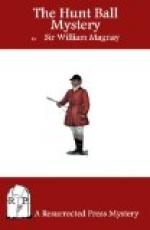“Yes,” Gifford responded mechanically, “of course it removes any serious suspicion from Miss Tredworth.”
“And,” said Kelson eagerly, “it divides the odium, if there is any. In fact, to my mind, it reduces the whole suspicion to an absurdity. For that both girls could have been concerned in Henshaw’s death is absolutely incredible.”
“Yes,” Gifford agreed thoughtfully; “they could not both have had a hand in it.”
“Or either, for that matter,” Kelson returned with a laugh. “Don’t you admit that the idea is in the highest degree ridiculous?” he added more sharply as Gifford remained silent.
“It is—inconceivable,” he admitted abstractedly.
Kelson, who had taken up his hat and crop and was turning to the door, wheeled round quickly. “My dear Hugh,” he exclaimed impatiently, “what is the matter with you? What monstrous idea have you got in your head? You owe it to me, and I really must ask you, to speak out plainly. It seems almost an insult to Muriel to ask the question, but do you still persist in the notion that she had, even in the most innocent way, anything to do with Henshaw’s death? Because I have her positive assurance that she knows nothing of it, beyond what is common knowledge.”
“I too am quite certain of that now,” Gifford answered.
“Why do you say now?” Kelson demanded sourly. “Surely you never seriously entertained such an abominable idea.”
“You must admit, my dear Harry,” Gifford replied calmly, “that with a man stabbed to death in practically the next room, the blood-stains on Miss Tredworth’s dress were bound to give rise to conjecture. One would suspect an archbishop in a similar position. But that is all over now. I am as convinced as you can be that Miss Tredworth knew nothing of the business.”
“On your honour that is your opinion?”
“On my honour.”
“This new discovery has changed your opinion?”
“It has at least shown me how dangerous it may be to jump to conclusions.”
Kelson drew in a breath. “Yes, indeed. Poor Muriel has suffered from the suspicion as well as from the horrible shock of the discovery. Still, this new development, though it acquits her, does nothing towards solving the mystery. I wonder whether Edith Morriston has any idea as to how her dress got marked.”
“I wonder,” Gifford responded abstractedly.
“Well,” said Kelson, “I’m off to carry the good news to Muriel. Don’t wait dinner for me if I’m not back by seven-thirty.”
It was rather a relief to Gifford to be left alone that he might review the situation without interruption. His first thought had been, could this last discovery be accountable for what he had seen that afternoon? Doubtless, after the information reached the police it would not be long in being conveyed to Henshaw. And he was now making use of it to put the screw on, using the hold he had gained over Edith Morriston to bend her to his will. What was that? Marriage? To Gifford the thought was monstrous; yet if it should be that Henshaw had information which put the girl in his power, what could she do? That she had consented to meet him secretly and listen to him went to show that she felt her position to be weak. If so she might need help, an adviser, a man to stand between her and her persecutor.




